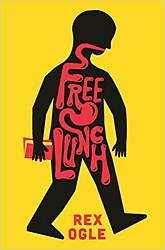
 Free Lunch
Free LunchReview posted January 23, 2020.
Norton Young Readers, 2019. 208 pages.
Starred Review
Review written January 2, 2020, from a library book.
2019 Sonderbooks Stand-out:
#4 Longer Children's Nonfiction
Free Lunch looks like an ordinary middle school novel. If you don’t pay attention, you might think it’s simply a hard-hitting, gritty story, with the hardships maybe a little overdone. But this story is true.
I don’t think it’s a spoiler to quote from the Author’s Note at the back. In fact, knowing that it’s true makes this all the more powerful.
I just finished writing the story you’ve just finished reading. I feel exhausted and sad and a little sick to my stomach. (Don’t worry, I’m not going to puke on you.) The reason I feel like I’m about to vomit, or maybe just burst into tears, is because everything that happened in this book happened to me in real life. Every laugh, every lunch, and every punch that you’ve read about is the result of an emotional deep dive into my past.
Like most children entering sixth grade, I was focused on friends and grades and locker combinations. But I was also worried about other things: where I’d get my next meal, what mood my mom or stepdad might be in when I came home from school, and when other kids would finally discover my darkest secret – that I was poor.
I was beyond terrified of my peers knowing that my parents – and by proxy, me – were on welfare, using food stamps and living in permanent-subsidized housing. Along with living under the federal poverty line, I also dealt with verbal and physical abuse on a regular basis. I hated my life and I hated myself. I didn’t want people to know that my family was scraping the bottom of the barrel, because I believed being poor meant being less-than. And I was deeply ashamed for it. And worse, it made me feel completely alone.
The title comes from Rex being on the free lunch program, and every single day the cafeteria worker would make him tell her he was on the free lunch program and loudly tell her his name so she could look it up in a notebook. This made it tricky to hide it from his friends.
In fact, many things in his life revolved around not letting his friends know he was poor. When they moved to subsidized housing near the school, he’d linger at school until most of his friends had left on the bus, so they wouldn’t see where he lived. And he never told them why he hadn’t gone out for football.
This story pulls you into the mind of a middle school kid, including his surprise at people who are kind and like him for who he is. It also gives you an inside perspective on a major problem in America, where nearly one in five children under eighteen live in poverty. This book is written on a level children can understand, but I hope adults will read it, too.
